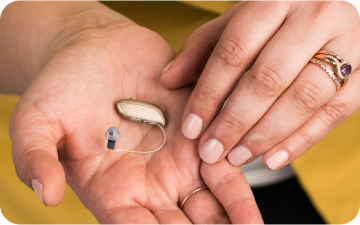Link Audiology provides evaluation and aural rehabilitation for auditory processing disorder in Washington. We have clinics in Silverdale, WA, Vashon, WA, and University Place, WA.
Auditory Processing Disorder (APD) is when your brain has trouble understanding the sounds it hears. Even though your ears work fine and can hear sounds, your brain mixes up or jumbles the sounds, making it hard to understand what people are saying. It’s like trying to listen to someone talk when lots of people are talking at the same time.
Auditory Processing Disorder (APD) can affect anyone, but it is most common in kids. Sometimes, kids have trouble understanding sounds because their brains mix them up. Adults can have APD too, especially if they had it when they were kids and didn’t know or if they hurt their head in an accident.
Symptoms of Auditory Processing Disorder
Here are some key symptoms of APD:
- Listening Trouble: It might be hard to follow conversations, especially in noisy places. They might ask others to repeat things often.
- Struggling with Directions: Having difficulty following spoken instructions, especially if there are several steps.
- Difficulty with Background Noise: Background noises can make it very hard for someone with APD to focus on what they’re hearing.
- Mishearing Words: People with APD might hear words incorrectly, confusing similar-sounding words like “cat” and “hat.”
- Problems with Reading and Spelling: APD affects how sounds are processed, making reading and spelling difficult.
Causes of Auditory Processing Disorder
Auditory Processing Disorder (APD) can have several causes, and understanding them can help us better support those who have it.
Here are some common causes of APD:
- Ear Infections: If you had a lot of ear infections when you were little, it might have made it hard for your brain to understand sounds.
- Being Born Early (Premature): Babies born too early might have brains that are still growing, which can make it harder for them to process sounds.
- Family Genes: If someone in your family has APD, you might have a higher chance of having it, too. It’s something that can be passed down from parents to kids.
- Head Injuries: If you hurt your head badly, it might damage the part of your brain that helps you understand sounds.
- Loud Noises: Being around loud noises for a long time can hurt your ears and brain, making it harder to understand sounds.
- Other Brain Conditions: Sometimes, other brain problems, like dyslexia or ADHD, can also make it harder to process sounds.
Auditory Processing Disorder Diagnosis and Treatment
There are different ways to diagnose APD, and its symptoms can look like those of other conditions like ADD/ADHD. It can be hard to know exactly who has APD.
Dr. Grolley and Dr. Souza learned to diagnose and treat APD from Dr. Jeananne Ferre, one of the co-developers of the Ferre-Bellis model. They developed the diagnostic protocol used at Link Audiology from their experiences learning from Dr. Ferre.
What is the Ferre-Bellis model?
The Ferre-Bellis model is a way to understand how people with Auditory Processing Disorder (APD) have trouble processing sounds. Think of it like viewing different types of listening problems that can affect how someone hears and understands what others are saying.
Managing Auditory Processing Disorder
Fixing Auditory Processing Disorder (APD) isn’t always possible, but there are many ways to help manage and improve the condition. Our recommendations focus on both management (mitigating the negative effects of APD) and remediation (improving listening skills over time using different exercises).
Here are some strategies that can help:
- Listening Exercises
- Speech Therapy
- Assistive Listening Devices
- Support at Home
Link Audiology | Auditory Processing Disorder Diagnosis and Treatment in Washington
We understand that Auditory Processing Disorder (APD) can be challenging. We are here to help with comprehensive check-ups and special treatment plans.
Our skilled audiologists in Silverdale, WA, Vashon, WA, and University Place, WA, use advanced tools to see how well you process sounds. We offer personalized therapy and tips to help you or your loved one manage the challenges of APD.
Contact us today to schedule an appointment and take the first step towards better hearing and improved quality of life.

